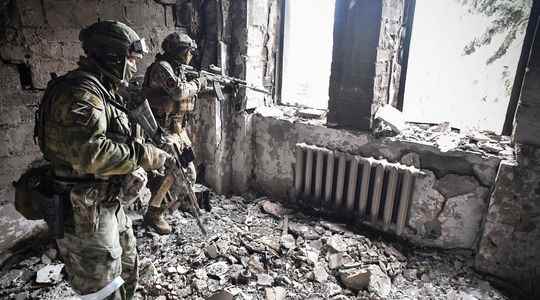Faced with fierce resistance from Ukrainian fighters in Mariupol, has Russia crossed the red line by using chemical weapons? In any case, this is what Ukrainian sources accuse him of. As a sign of growing concern over this issue, the head of American diplomacy Antony Blinken, for his part, on Tuesday shared “credible information” on the possibility that Russia might use “chemical agents”, without, however, confirm that this had already been the case.
On Monday, Ukrainian parliamentarian Ivanna Klympush spoke about Twitter the use by Russian forces of an “unknown substance” in Mariupol, “most likely chemical weapons”, adding that several people were suffering from “respiratory failure”. A few hours earlier, the Azov battalion, entrenched in the port city, had claimed on Telegram that a Russian drone had dumped a “toxic substance” on soldiers and civilians.
“It is necessary to be extremely careful at this stage, samples would be necessary to be able to prove that chemical weapons were used. But given the obsidional situation in Mariupol, it is difficult to obtain irrefutable proof, points out Olivier Lepick , associate researcher at the Foundation for Strategic Research (FRS) and specialist in chemical and biological weapons. For the moment, the clinical picture of the victims does not resemble poisoning with an organophosphate neurotoxin, that is to say the latest generations of military chemical agents that Russia may possess.”
Threat brandished by Russian forces
As of Monday, London announced that it was “working urgently” to “verify the information” from the Ukrainian side. The threat of the use of chemical weapons has been hovering over the conflict for several weeks now. In March, the West warned of this possibility, after fanciful accusations by Moscow of Ukrainian laboratories used by kyiv and Washington to produce “biological and chemical weapons”. The fear of the United States and Europe? Let this rhetoric not be used as a pretext for the use of banned substances on the battlefield by Russia.
There is something to be worried about. The pro-Russian spokesman for the self-proclaimed republic of Donetsk (DNR), Eduard Basurin, spoke on Monday of the possibility of using “chemical troops who will find a way to get the moles out of their hole”. A reference to the Ukrainian fighters who are still resisting, entrenched in the tunnels of the immense industrial complex of Azovstal near the coast.
Is this terrible threat credible? Prohibited by international treaties, the use of chemical weapons by certain countries “may aim to eliminate pockets of resistance in urban areas, insofar as they force combatants to flee who do not have the protective equipment to deal with them, details Jean-Pierre Maulny, Deputy Director of the Institute of International and Strategic Relations, and specialist in defense issues. They also have a significant psychological effect because of the fear they arouse.”
Limited risk of large-scale use
Signatory in 1993 of the International Convention on the Prohibition of Chemical Weapons, Russia had undertaken to destroy its 40,000 tons of chemical agents inherited from the Soviet era. The destruction of its stocks – which it announced that it had completed in 2017 – had been confirmed by international inspectors from the Organization for the Prohibition of Chemical Weapons (OPCW). However, Moscow’s sincerity was quickly called into question by the poisoning with Novichok – a neurotoxicant bearing the mark of the Russian secret services – of the former Russian agent Sergei Skripal in 2018, then that of the opponent Alexei Navalny in 2020 .
“It is likely that Russia has taken liberties with its commitments. However, it is probably not in a position to carry out extensive chemical warfare, as this would require very large quantities of chemical agents. But it is unlikely that Moscow has them, judges Olivier Lepick.If their occasional use in urban combat seems possible, their use in the context of large-scale operations, in which it would also be necessary to protect Russian soldiers against these weapons which are relatively persistent and extremely dangerous, seems to me much more hypothetical.”
Breaking this prohibition would in any case not be without consequences on the international scene. “If this use were to be proven, it would inevitably lead to a new series of Western sanctions, points out Jean-Pierre Maulny. This could also lead to a reinforcement of arms deliveries with heavier equipment”. Concretely, what would be the risk for Moscow? To see an increase in the supply of artillery pieces to Ukraine, like the T-72 tanks sent by the Czech Republic in early April. Or to remove the last reluctance in Europe, as to an embargo on Russian gas.
